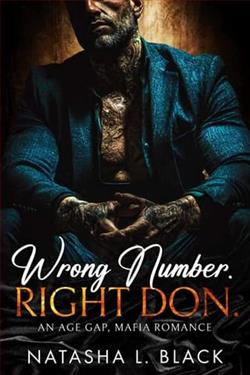Page 68 of Scarlett and the Big Bad Billionaire
My heart sank. I wanted him to be open with me, to show me his real self. If we were going to do this thing, get naked with each other physically, I wanted to get naked emotionally as well.
Maybe that wasn’t very fling-y, but I already knew I was terrible at casual sex. I didn’t want it to be like last time where we’d shared our bodies for a week and then parted, still strangers.
“You said before that your gut had never steered you wrong. Listen to it now,” I urged. “Isn’t it telling you that you can trust me?”
He huffed a small laugh. “Yes, but honestly… I sort of lost faith in my gut somewhere along the way.”
I pushed up onto one elbow and studied his face. “Why?”
Once again, his expression shuttered. He wasn’t going to talk to me. I rolled onto my back, swallowing the lump that had formed there.
For a few minutes we lay there, side by side, listening to the waves crash. Then Gray spoke. His voice was quiet, more serious than I’d ever heard him sound.
“The first time we met, you brought up the statistic that ninety percent of Navy SEALS’ marriages end in divorce.”
“I remember—shocking, I know, considering my blood alcohol level at the time.”
“There are some obvious reasons—you can be deployed for eight or nine months at a time, and the spouse at home has no idea where the soldier is or when he’ll be back,” he said. “That’s stressful. But I think it’s more than that. When they’re home, there’s a lot of PTSD and sleep problems. There are injuries with some lingering effects. Some of my buddies talk about problems with alcohol and anger issues. Some say they feel emotionally numb.”
None of this was a surprise to me. I’d lived with it daily until my dad had moved out and disappeared from my life.
These were all the reasons that had scared me away from dating guys in the military in the first place.
“Have you dealt with any of that?” I asked, assuming that was what he was leading up to.
“I’ve been pretty lucky, actually,” he said. “I didn’t sustain any major injuries during training or operations, so physically I’ve been fine. The hardest part for me was some of the things I’ve seen… and some of the things I had to do.”
“Is that why you quit? Because you couldn’t do it anymore?”
He squinted at the night sky, obviously not wanting to talk about it, but he did anyway.
“Nah, I probably would have stayed on the teams forever—or at least until I couldn’t walk anymore from knee damage. I testified against my commander in a court martial. All of us did—all the guys in our squad. After something like that, you’re not exactly welcome on the teams anymore. He was found guilty, but no matter what, some guys are gonna question whether you’ve really got their back, thinking maybe you’re looking overtheirshoulder with an eye toward reporting whatever they’re doing to a superior.”
“So why did you testify?”
“I didn’t see any other choice. None of us did. You have to do a lot of things on missions you’d rather not do. War isn’t pretty. But our leader—Gandalf—was out of control. He used to be a kind of hero to me, you know? He was a badass, but also smart. But he changed. I don’t know if he had CTE from too many blast concussions or if he just got numb to the killing after a while, but he was toxic. Scary. I mean, some of the stuff I saw him do in Iraq was fucking evil.”
He drew a deep breath and let out a shaky exhale.
“And it was illegal, a violation of U.S. military rules and practices. I mean at what point do you cross the line from soldier to serial killer? It was disturbing. We all talked about it, wondered if we should say something, do something. During our last operation, he was like a robot or something—he didn’t carewhohe killed. None of us wanted to turn him in, but it had to stop. So, every member of our squad broke the code of silence and testified against him. I thought I was doing the right thing. Sometimes I still wonder if my gut steered me wrong.”
He looked away, anger and shame coloring his face.
“I read about the trial online. You did do the right thing.”
He seemed to be irritated by my sympathetic tone. “It doesn’t always feel that way. I lost my SEAL career. And a lot of people took his side, refusing to believe a platoon leader could ever do anything wrong. He lied, he called it a ‘mutiny,’ said we just wanted to take him down because we didn’t like his ‘leadership style.’ SEALs are supposed to be all about honor and integrity. That’s what the Trident badge stands for. In this case honor required turning on one of our own. It was the hardest thing I ever had to do. The stuff people printed and posted about us afterward didn’t help.”
“And you don’t think it still affects you?” I asked.
“If you’re asking whether I’m fucked up in the head, the answer is no. I mean, I’ve dealt with my fair share of fallout, but I found ways to deal with it.”
“Like what?”
He darted a look at me then looked away again. “I saw a therapist for a while. My art helps. And I try to help other people when I can.”
“There are a few residual effects,” he admitted. “I lost faith in my gut. The first time I met you, it was telling me—screaming actually—for me to go for it. With everything I had. I knew something important was happening. But then we were deployed for a hostage rescue. Right after that my team went to Iraq, and everything changed.”
“The stuff in Iraq and the trial made you lose faith in yourself?”















